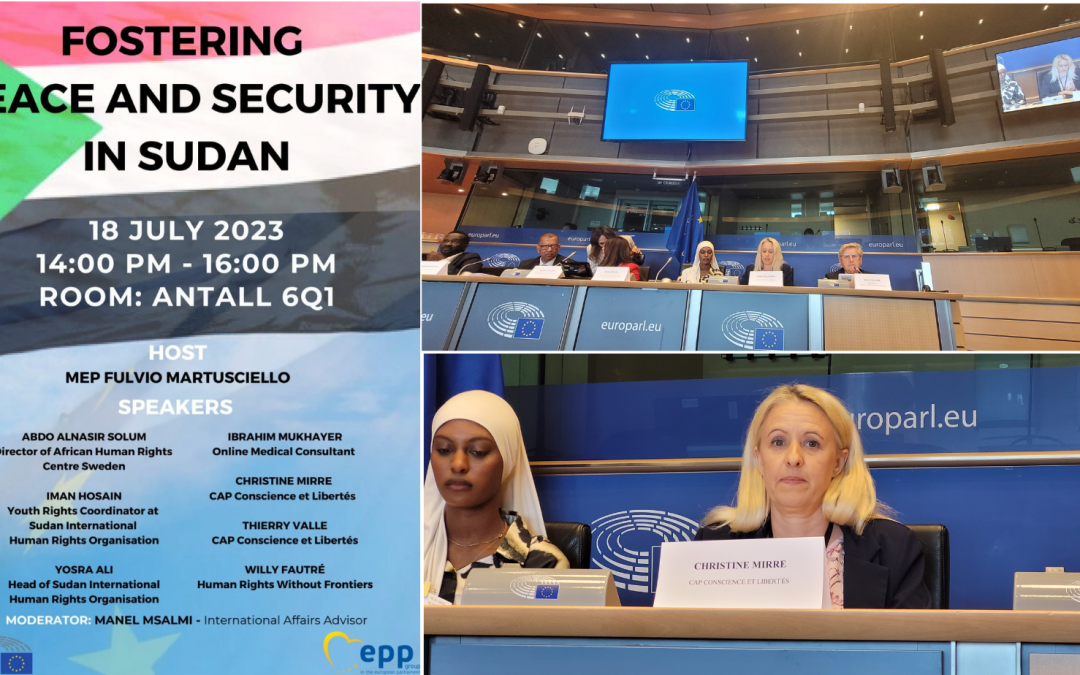Speech at the Conference “Fostering Peace and Security in Sudan”
hosted by MEP Fulvio Martusciello at the European Parliament, 18 July 2023
Christine Mirre – CAP Liberté de Conscience
Speech Soudan 18/07/23
As we all know, women, along with children, are the most vulnerable targets in wartime.
Gender-based violence and crime, such as rape and the destruction of property and lives, are the greatest threats to women, and these crimes are often overlooked and committed with impunity.
According to UN estimates, even before the fighting broke out on April 15, more than 3 million women and girls in Sudan were at risk of gender-based violence. This figure has since risen to 4.2 million.
Women, including refugees living in Sudan before the conflict, reported incidents of gender-based violence. Women fleeing Sudan’s borders have testified to the horrific violence they have faced.
It is known that the risk of sexual violence is particularly high when women and girls move in search of safer places.
Here I would like to quote 2 representatives of UN bodies:
Martin Griffiths, Under-Secretary-General for Humanitarian Affairs and Emergency Relief Coordinator: “It is unconscionable that Sudan’s women and children – whose lives have been upended by this senseless conflict – are being further traumatized in this way. What we are witnessing in Sudan is not just a humanitarian crisis; it is a crisis of humanity.”
Catherine Russell, Executive Director of UNICEF: “What we’re seeing yet again is a rise in horrific sexual violence during times of crisis. It’s a pervasive, yet all too often concealed human rights violation, which can have devastating long term physical and mental impacts on survivors. It’s critical to design prevention and response plans that put the needs of women, girls, and all survivors at the heart.”
Sudanese women face immense challenges in overcoming the consequences of war. They have been betrayed by the very forces that were supposed to bring them stability and security. Despite these difficulties, Sudanese women remain determined to make their voices heard in peace-building efforts.
To understand the role of Sudanese women in the struggle for a country at peace and respectful of their rights, it is important to look back at the history of women in Sudan. Since the late 19th century, women have been organizing and forming groups to resist colonization and fight for their rights.
The creation of the Sudanese Women’s Union in 1952 marked a turning point in the women’s movement.
We owe it the adoption of “equal pay for equal work” in 1953, and the tackling of a plethora of discriminatory practices often presented as revered traditions.
It also put an end to “obedience laws”, which forced a woman to return to her abusive partner and forfeit all rights due to her as a human being.
Since the Sudanese revolution of 2019 that ousted dictator Omar al-Bashir, the vital role played in shaping this historic event by these women, known as “Kandakat” in reference to the powerful Nubian queens has attracted considerable international attention.
Their protests to the central army command were extraordinary in the face of 30 years of systematic suppression of their rights. Al-Bashir’s 1996 Public Order Law was not only detrimental to ethnic minorities, but also to women, who became the ultimate targets of gender-based violence, public flogging, imprisonment, harassment, confiscation of property and so on.
The exclusion of women was visible during the 2020 Juba peace talks for peace in Sudan, which failed to achieve peace and were one of the factors that fostered the current conflict.
Despite the extraordinary struggle of Sudanese women and their unyielding quest for justice, a climate of impunity still reigns in the country. None of the perpetrators of violence in the South or Darfur have been held to account for war crimes, crimes against humanity or gender-based crimes.
It is essential that women’s voices are heard and valued in peacebuilding efforts, as they have a unique and vital perspective to offer.
Women are affected by conflict in a different way to men, and their experiences must be considered in the implementation of peace-building efforts. Women can play a crucial role in building lasting peace by advocating the inclusion of marginalized groups and promoting respect for human rights.
The inclusion of women in peace processes has been proven to lead to more comprehensive and lasting peace agreements, as well as greater respect for human rights and gender equality.
In conclusion, I would like to mention that several European countries, such as Belgium, the Netherlands, Luxembourg, etc., stressed the importance of including women in the Sudanese peace process during the last 53d session of the UN Human Rights Council on June 19, 23.
As highlighted by the Lithuanian representative on behalf of the Nordic and Baltic countries at the 53d session of the UN Human Rights Council:
“Ultimately, a return to an inclusive political process, where women are included, is where the future for Sudan lies.”



